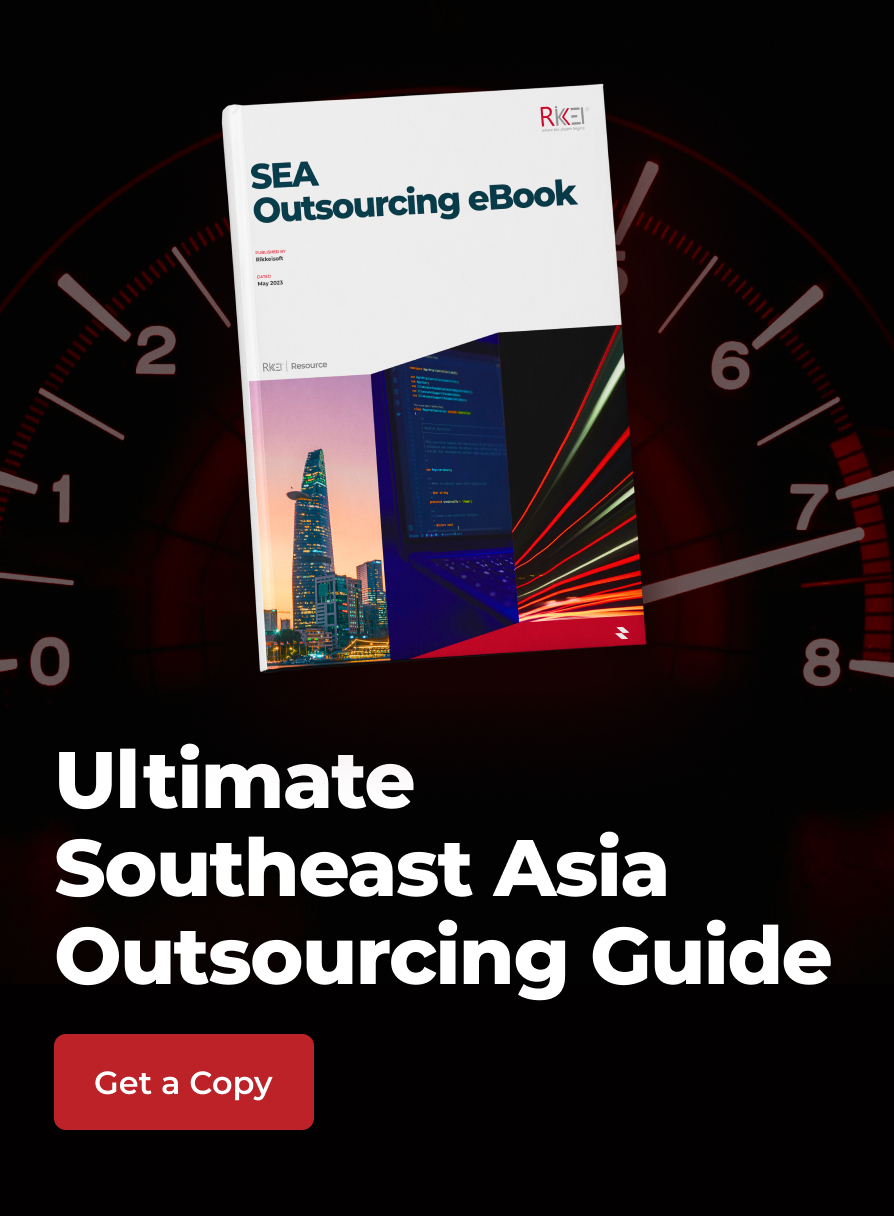Outsourcing in Vietnam: Data-backed Opportunities & Challenges [Infographics]
Contents
Outsourcing is a rising sector in Vietnam, with the IT outsourcing industry alone projected to grow 13.47% by 2027. Affordability and a large pool of tech talents are among the prominent reasons the country attracts global leaders looking for ways to cut costs effectively & manage their teams flexibly. Promising as it seems, there are plenty of things for CXOs to consider when hiring talents from an unfamiliar country like Vietnam for the first time. Thus, this article aims to give you the most unbiased information about outsourcing in Vietnam, including all perks & pitfalls you should know.

But first, let’s explore:
Introduction to Vietnam Outsourcing Market
Location: Southeast Asia
Timezone: Indochina Time (GMT +7)
Population: 98.17 million (2021)
GDP: $3,6842
Main Industry:
- Electronics
- Steel
- Food & beverage processing
- Agriculture
- Travel & tourism
While Vietnam is a fastest growing country in Southeast Asia, the country’s income level stills fall into the lower middle range, making it an attractive destination to hire global-standard talents at an affordable price.
Business outsourcing is becoming a new norm in these recent decades, with 90% of US businesses considering outsourcing for a part of their businesses. Joining this trend, Vietnamese talents and companies are offering services with a wide range of expertise:
Here are the most popular services in Vietnam outsourcing market:
- HR outsourcing
- Payroll outsourcing
- IT outsourcing
- Accounting and finance outsourcing
- Customer service outsourcing
Read more: What Does Outsourcing in Business & How Does It Work?
Introduction to IT Outsourcing in Vietnam
The IT industry in Vietnam reached 136.1B dollars in revenue in 2021, doubling its 2016 number. Moreover, giant tech companies such as Intel, IBM, Samsung Display, Nokia, and Microsoft have invested in Vietnam, given the country’s rising reputation as a technology hub in the APAC region. All these achievements have supported the growth of Vietnam as a go-to destination for IT outsourcing.
For more information, the country is ranked 6th in Kerney’s 2021 Global Service Location Index. This index reflects a country’s software outsourcing ability based on various criteria such as financial attractiveness, skills & availability, business environment & digital resonance.
Some prominent data about Vietnam IT:
- Number of IT engineers: 480,000
- Most popular programming languages: Javascript, Java, PHP, C#/.Net, Python
- Most popular IT jobs: Backend-developer, full-stack developer, frontend developer
- Most common types of IT services in Vietnam: eCommerce, Fintech, Car/food ordering, software outsourcing, business process outsourcing

Outsourcing in Vietnam: Opportunities
Digital transformation is a buzzing word in recent years, motivating all businesses owner to capitalize on this trend or to lose their competitive edge. Since implementing a digital innovation for your business is never a budget-saving strategy, most companies tend to outsource parts of their work & processes to talents in less-developed countries. The goal is to take advantage of these countries’ low labor costs.
Compared to the prevalent outsourcing destinations such as China, India, and Ukraine, the cost of living & laboring hiring in Vietnam is more financially beneficial for businesses.
Vietnam’s labor cost is relatively lower than other favorable countries for outsourcing. The minimum wage in Vietnam is 95% lower than in the US.
- Vietnam average salary: US$ 284/ month
- India average salary: US$ 396/ month
- Philippines average salary: US$ 1620/month
- China average salary: US$ 1,161/month
- Ukraine minimum wage: US$ 398.627/month
Taking developers – one of the most in-demand jobs as an example, the cost to hire a software developer in Vietnam is significantly lower than that of other countries in APAC & Western regions.
Learn more about outsourcing in Vietnam:
Top 10 Trustworthy IT Outsourcing Companies in Vietnam
Ultimate Guide to Choose IT Services For Small Business
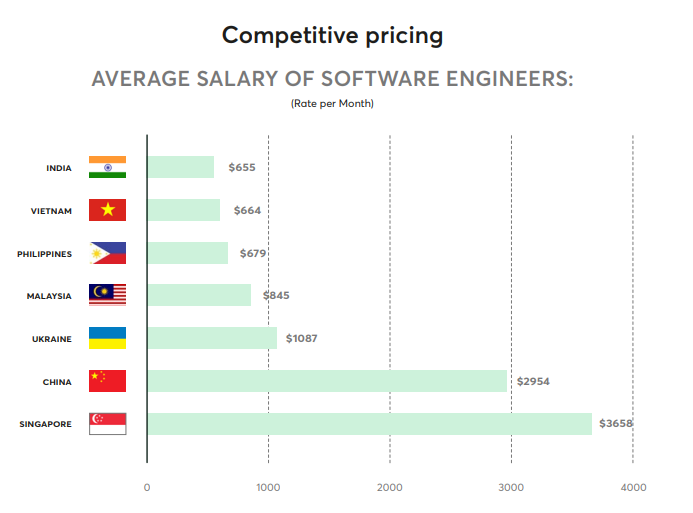
IT outsourcing in Vietnam: Opportunities
1. A large pool of IT talents
Vietnam has more than 400 universities & education centers teaching programming & software development. These institutions produce around 57,000 tech freshers every year, according to Topdev. Meanwhile, approximately 400,000 IT engineers are working in 60,000+ digital technology firms in the country. The data has proven the wide availability of tech talents & how the tech industry is booming in Vietnam. In fact, with this growth momentum, the country has the potential to be the next global force in the tech industry, said Bloomberg.
Facts: Rikkei Academy – our school for technical training – has helped improve the skills of over 200 tech engineers in 6 months.
2. Highly-skilled tech staff
“Are people in Southeast Asia good at software engineering?”
It’s common for business leaders & recruiters worldwide to cast doubt on the work quality of Asian professionals, including Vietnamese tech engineers. This is often the case when these hirers haven’t outsourced talents from the eastern countries.
However, there are reasons to trust the developer’s quality in Vietnam.
- Vietnam ranked 29# worldwide in developer Skills Charts of Skill Value’s Report 2019 (1)
- Vietnam is among the top 10 in Skill Value’s World Rank of Best Developers Survey after the USA, UK & France (2)
- Vietnam is one of the two best SEA destinations for software outsourcing in 2022, according to Accelerance (3)
Certification-wise, there are many software development companies in Vietnam who have accomplished CMMI level 2. For your information, CMMI is the most standardized certification measuring the development maturity of an organization. Some technology firms, including Rikkeisoft have gotten the CMMI level 3, indicating that the organization can perform development tasks at a “defined” level. A few firms, such as FPT, have achieved level 5 – the highest maturity CMMI level.
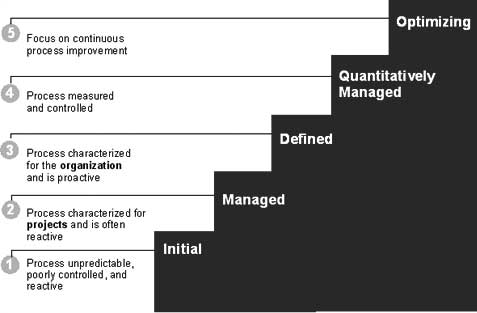
Rikkeisoft have gotten the CMMI level 3, indicating that the organization can perform development tasks at a “defined” level. A few firms, such as FPT, have achieved level 5 – the highest maturity CMMI level.
Finally, many tech giants such as IBM, Sony, LG, Microsoft, and Samsung have relied on Vietnamese engineers for parts of their innovation work. The trend proves the quality of Vietnamese programmers compared to the global standard.
3. Hard-working
When looking for employees, most business leaders agree that a learning attitude is as equally important as one’s knowledge and skills. This is especially true when finding offshore talents – communication & continuous improvement are the core foundation of a long-term, mutually beneficial relationship.
If you’re looking for similar traits when outsourcing, Vietnam is your ideal destination.
Embracing a similar working culture to Japan, China and South Korea, the Vietnamese are known as hard workers. Expats who live in Vietnam have shared that “The Vietnamese have a healthy work ethics & and are generally hard-working & industrious.”
Let’s use an example from IT outsourcing. While not all Vietnamese developers are accustomed to a specific tool or field of development that their clients require, they always strive to learn & master the skills with a problem-solving attitude.
4. Team-oriented
Outsourcing requires a smooth operation between the business hirers & the offshore worker team, making teamwork a valuable skill that all outsourcing service providers should have.
Most Vietnamese are team players, allowing them to deliver great project outcomes to their offshore customers. According to Brian McDermott, a Singaporean managing director with rich experience working with the Vietnamese, “the Vietnamese works extremely well in team”
5. Socioeconomic stability & Covid19 resilience
Investing your money and effort in a country with high socio-economic stability can be a game-changer for your business, whether you are from a small business or a Fortune 500 company. Any political upheaval can cause a severe disruption in your outsourcing process, leading to delays, accumulating costs & undesired outcomes.
For example, according to the Wall Street Journal, the Russian invasion is believed to put the Ukrainian booming tech industry at risk, causing an 80% computer internet shutdown in a tech company.
In this case, as the UK government claims, Vietnam is “one of the more stable countries in Southeast Asia” with domestic conflicts strictly under control.
The country is also ranked no #44 in the Global Peace Index 2022, increasing from no. 50th in the 2021 Index.
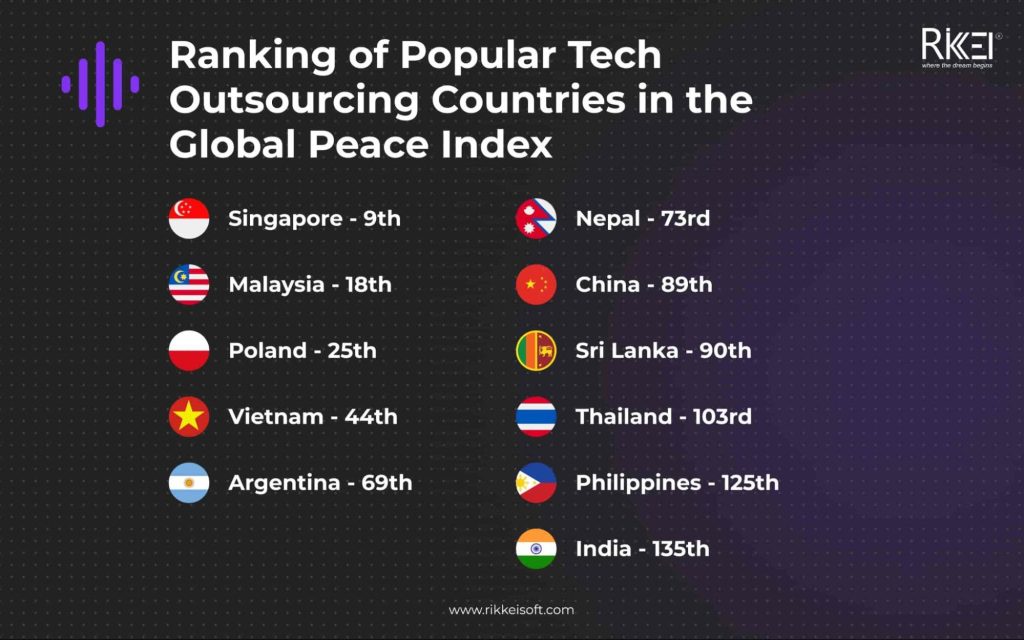
In terms of growth, Vietnam is one of the Southeast Asian countries with the highest GDP increase (13.67% in 2022), while also being highly resilient to Covid19. Until December 2022, the Covid19 situation in Vietnam is totally under control, with a high vaccination rate and free border entry for all foreigners.
Amid the food & energy crisis and inflation spike in 2022, the inflation rate in Vietnam ranges from 3% to 4%. This is an acceptable rate compared to that of other countries’ counterparts, showing the country’s resilience and stability against worldwide economic uncertainty.
6. Supportive Investment Environment
Vietnamese government has made a great effort to make the nation more accessible, more transparent and more liberal for foreign businesses & investors. These include constant regulation updates, new trade agreement signups, and more.
Up until 2022, Vietnam has been a member of these agreements:
- ASEAM and ASEAN Free Trade Area (AFTA)
- World Trade Organization (WTO)
- Bilateral Trade Agreements (BTA) with the US
- EU-VN Free Trade Agreement (EVFTA)
Moreover, thanks to more flexible regulations (e.g. lower income tax for corporate), Vietnam has attracted foreign direct investment (FDI) from global enterprises such as LEGO, Apple, Canon, Microsoft, Samsung, etc. The country’s FDI has grown healthily from 1.61 billion USD in January to 19.68 billion USD in November 2022.
For these reasons, the favorable business environment in Vietnam can make it easier for hirers to outsource Vietnamese talents at a great cost with little legal hassle.
IT outsourcing in Vietnam: Challenges
1. Timezone Gap
While the timezone in Vietnam is extremely convenient for communication in the Asian region, companies from the US and the UK may find it hard to connect & share information with their Vietnamese outsourcing team from the other side of the world.
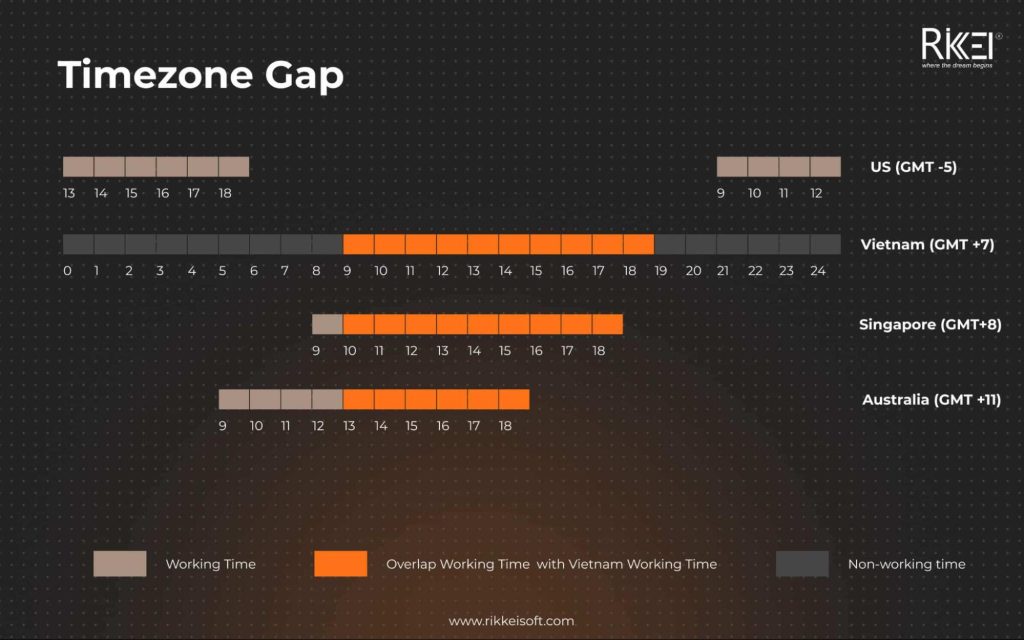
Similarly, this timezone may be more advantageous to some outsourcing models than others.
For example, a client of ours – a big asset management firm in the US & UK – purposely looks for a Vietnamese tech company. This helps them maintain a safe and risk-proof digital transaction for the clients 24/7. This collaboration is based on the offshore development model when we provide dedicated teamwork as a division of the client’s team to fulfill their various requirements.
However, unlike companies such as our clients, other businesses looking to develop offshore projects using the DevOps and Agile methods may find the timezone gap cumbersome. As these developing methodologies highly emphasize real-time communication & quick project adjustment, time zone differences may cause a delay in progress.
2. Language Barrier (But Improving)
Besides skills & professions, poor English proficiency is among the top reasons for an outsourcing project to fail. The language barrier is also what business leaders worry about the most when finding outsourcing talents in Southeast Asian countries like Vietnam.
This challenge is especially true in Vietnam. In 2021, the Vietnamese were ranked 66th on the Global English Proficiency Index.
However, the situation quickly escalated in 2022, when Vietnam climbed 6th position to land at #60th, achieving a “moderate” level of English proficiency.
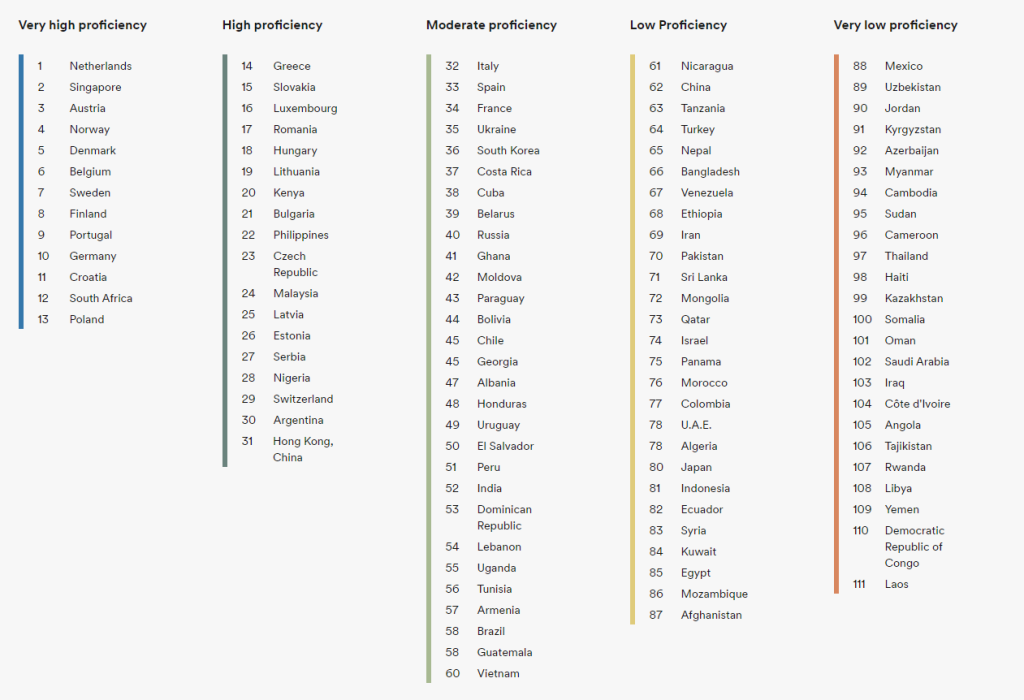
Also, according to the Index, popular outsourcing countries having better English proficiency than Vietnam include Poland, the Philippines, Ukraine, and India.
Also, it’s worth noting that English proficiency varies across industries & sectors. In the IT outsourcing country, most developers can understand English documents & communicate with clients in English. People having higher seniority or working closely with clients such as technical consultants or business development executives are often fluent in English. Thus, you can easily express your ideas & requirements to them with no problems.
In Rikkeisoft, we highly motivate our team members to leverage their English skills with various training & incentives.
Get Our Company Profile
3. No National Data Protection Law
Currently, Vietnam does not have an official data protection law, making it difficult for global businesses to create their data privacy policy. While many companies are attempting to comply with GDPR and Vietnam’s data protection law, they need to face various challenges from incomplete rules or ununified information sources.
These are big disadvantages for enterprises that plan to invest in Vietnam, as there is no solid legal framework protecting their intellectual properties.
Who should outsource to Vietnam?
As outsourcing is gaining popularity as a cost-saving way for businesses to cope with labor shortages and achieve their development goal, many businesses are using this model. In case you haven’t outsourced, or outsourced talents from an offshore country before, you should do lots of relevant research before making a decision.
Thinking of outsourcing to Vietnam? Vietnam is the best outsourcing country for these businesses:
- Western-based global enterprise looking for an Asian offshore development center:
Extending their influences worldwide, many global firms need to leverage their IT infrastructure & IT supports to enhance customer experience around the globe around the clock. While their western IT in-house team can manage all tasks in the daylight, the Asian team can do the work in the Western nighttime. Also, as the cost of saving in Vietnam is generally much lower than in Western countries, thus, businesses can save costs paid to hire talents, infrastructure costs & more.
See more: Everything about Offshore Development Center
- All developed companies in the APAC & MENA regions.
The cost of living in countries such as Singapore, Japan, Australia, and Saudi Arabia is significantly higher than that of Vietnam, making outsourcing in Vietnam a financially attractive option for people in these countries.
Moreover, as the timezone is distinctly different (e.g., Japan is only 2 hours ahead of Vietnam), it’s easier for businesses in these countries to work and communicate with their Vietnamese outsourcing team.
Finally, for Asian-company countries only, they may find it easier to work with the Vietnamese as they share many similarities in business culture.
This is why Vietnam is the favorite outsourcing destination for Singapore and Japan. Rikkeisoft is proud to serve many Japanese enterprises of all sizes, and our efforts have helped us win the Best Venture 100 – a prestigious award in Japan.
- Small businesses needing to digital transform
Digital transformation is a massive trend in this decade, with all companies and businesses, at some level, joining in a race to innovate their organization. Working toward a digital-focused future, small businesses also need to, for example, automate some of their processes or create their own data system.
However, the problem is, while many small business owners have good business senses and market understanding, if they’re not from a technical background, it can be challenging for them to grasp technology concepts & understand how to innovate their businesses to achieve their goals.
Thus, they will need to rely on IT consulting services, which can be very expensive. Outsourcing a reliable Vietnamese IT service provider offering both technology consultation & implementation can help reduce the cost. Again, despite many doubts about the Vietnamese’ technology expertise, it’s true that they are growing faster than ever to understand complicated technical concepts and catch up with the most innovative countries.
FAQ:
1. Is Vietnam good for outsourcing?
Yes, Vietnam is a rising destination for outsourcing, especially software outsourcing. The country has a large pool of talents with in-depth expertise, a good teamwork spirit, stable socio-economy, while allowing business to outsource cost-effectively.
2. What is the number #1 outsourcing location in the world?
Popular countries for outsourcing include India, China, Philippines and Vietnam in Asia, Poland and Ukraine in EU, and Argentina in America.
More From Blog

October 28, 2025
Australia’s Fintech Revolution: Trends Shaping the Future of Digital Finance
Australia has emerged as one of the most dynamic fintech hubs in the Asia-Pacific region, driven by strong consumer demand for digital financial services, supportive government regulations, and the widespread adoption of innovative technologies. As the industry matures, the imperative for digital transformation has become unmistakable: fintechs and financial institutions alike are under pressure to […]

August 12, 2025
AI and Big Data in Building Smart Insurance Platforms
The insurance industry is now standing at a pivotal moment in its digital evolution. Traditional insurance models built on historical data analysis and reactive risk assessment are rapidly giving way to intelligent, predictive platforms powered by artificial intelligence and big data analytics. This transformation represents more than technological modernization; it’s a fundamental reimagining of how […]

July 23, 2025
Insurtech’s Game-Changing Trends: How AI and Digital Transformation Are Reshaping Insurance
The financial technology sector is experiencing unprecedented change, making it essential for business leaders and technology professionals to stay ahead of emerging innovations. Throughout 2025, insurance technology (insurtech) has emerged as a powerful catalyst for change, fundamentally altering how insurance providers conduct business, engage with clients, and assess risks. This technological evolution represents more than […]

April 4, 2024
Big Data Performance: Maximize Your Business Value
In today’s data-driven world, organizations are constantly generating and collecting immense amounts of data to understand their customers more deeply. This data, often referred to as “big data,” holds immense potential for organizations to seek opportunities and overcome challenges. But accessing and analyzing big data isn’t enough to have proper strategies; organizations must pay attention to […]

April 4, 2024
How Real-Time Data Analysis Empowers Your Business
In today’s fast-paced business landscape, the ability to quickly make data-driven decisions has become a key differentiator for success. Real-time data analysis, the process of analyzing data as soon as it’s generated, has emerged as a powerful tool to empower business across industries. By leveraging real-time data analysis, organizations can gain timely and actionable insights, […]

April 4, 2024
Differences Between Data Science and Computer Science
Data Science and Computer Science are distinct fields overlapping in certain areas but have different focuses and objectives. The article below will help you clearly understand the differences and the close connection between the two fields. What is Data Science? Data Science is an interdisciplinary field that combines scientific methods, processes, algorithms, and systems to […]
![Outsourcing in Vietnam: Data-backed Opportunities & Challenges [Infographics]](https://rikkeisoft.com/wp-content/themes/main/assets/images/home/logo.svg)
